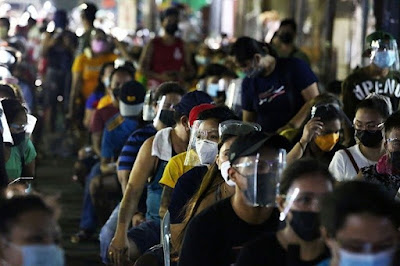Tracy Maureen Perez (Miss World Philippines Organization Facebook)
by Robert Requintina, Manila Bulletin
Miss Philippines Tracy Maureen Perez is ready for the world as she remains in the top fighting form for the Miss World 2021 beauty pageant, which will be held in Puerto Rico on March 16.
During an intimate catch-up huddle at Pandan Cafe in Quezon City on Feb. 2, Perez said that she’s slowly but surely getting the momentum back in time for the finals.
“I’ve worked the hardest to be where I am, and I’m proud of that. I basically came from scratch, And they see that. They don’t see a beauty queen, they see a person. And that’s very important,” she said.
Perez, 28, also said that she doesn’t feel any pressure now being the official flag bearer of the Philippines. “I don’t really think about it much. My co-candidates told me that I’m different from what they envisioned Miss Philippines to be.”
With the guidance of Miss World Philippines National Director Arnold Vegafria and the expert supervision of Aces and Queens trainers, Perez is confident she can prep herself up again for competition within a month’s time.
“If there’s one thing I learned from my Miss World journey so far, I just always have to stick to what I know. It pays to just be yourself because they know if you’re putting up a facade,” she said. “That’s also my takeaway from our previous queens, that there’s really no formula. At the end of the day, it’s just faith. It’s about you performing and just being prepared for anything.”
Only the Top 40 candidates have been invited to go back to Puerto Rico for the finals and the Cebuana beauty queen is one of them. Perez is one of the 15 winners of the pageant’s fast-track challenges. They will be joined in by 25 delegates who were chosen by the judges.
The 15 fast-track winners are: Cote D’ Ivoire, Mexico, Mongolia, India, England, Kenya, Philippines, South Africa, United States, Paraguay, Cameroon, Nepal, Venezuela, Nicaragua and Botswana.
The 25 judges choice for the Top 40 are: Poland, Hungary, Puerto Rico, Colombia, The Czech Republic, Northern Ireland, France, Ecuador, Guinea, Bahamas, Malaysia, Brazil, Madagascar, Indonesia, Trinidad & Tobago, Argentina, Canada, Dominican Republic, Ireland, Somalia, Chile, China, Sri Lanka, Vietnam and Iceland.
When the Miss World 2021 pageant was postponed again in December due to COVID-19, Perez said she was unfazed.
“It could be frustrating for some, but I tried my best to compose and calm myself because it’s something I couldn’t control. I’ll just take it as a blessing that I’ll have more time to prepare,” she said.
Tracy was able to take some time off as she took her first US trip and spend the holidays with her relatives in Oceanside, San Diego, California. She returned to Manila mid-January, just in time to mount her battle plan to hold her own relief operations for the victims of typhoon Odette, which also hit her hometown in Argao, Cebu.
“I’ve been in contact with relatives and friends in Cebu during the height of the typhoon, so I know the situation. Some areas still don’t have power yet. Even our house in Argao was hit, but not as badly as the other areas.”
Perez said that she is also privileged that her outreach project for the single mothers in Cordova, Cebu, had been selected as her beneficiaries of her Beauty With A Purpose Challenge.
“During the Miss World preliminaries, I think that was one of my proudest moments – not because I was being recognized – but more because I had fulfilled my mission for them. That’s the time I realized that there have not been as many efforts addressing the struggles of single moms. So when Miss World organization selected my project, I knew I had done my rightful part,” she also said.
Perez continued to talk in detail about her plan for solo parents.
“It’s all about capabilities training, giving them the skills to earn a better livelihood, specifically BPO and computer training. We’re also bridging the gap for them by hooking them up with their eventual employers. One of our partners in the project is a BPO owner. So, they’re literally ready to take them under their wings very soon.”
The Miss World 2021 beauty pageant will be telecast on CNN Philippines on March 17.









